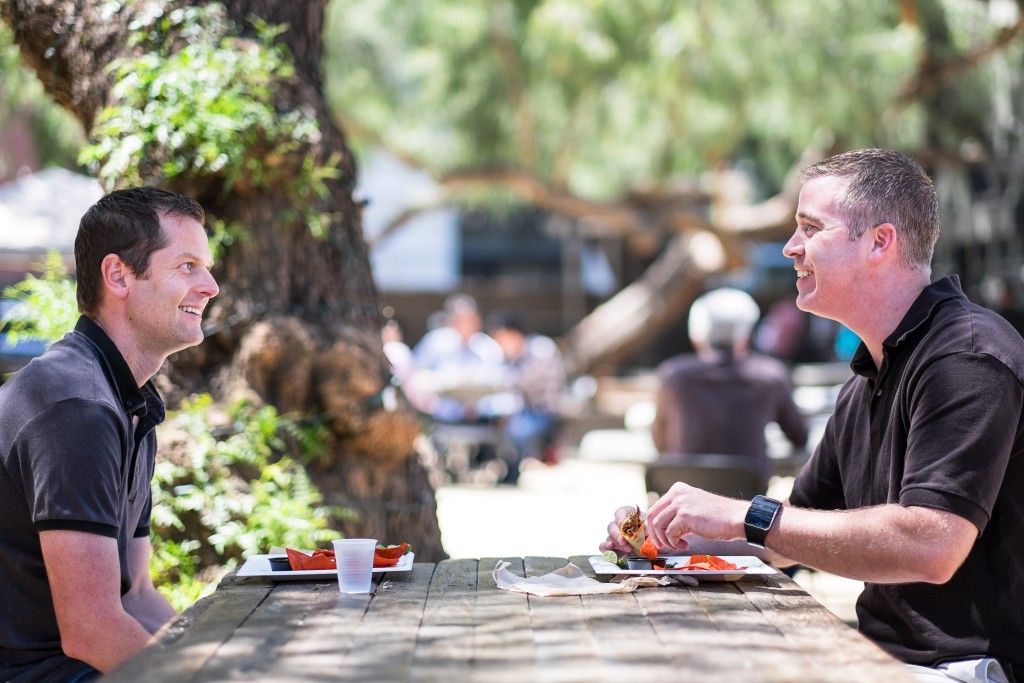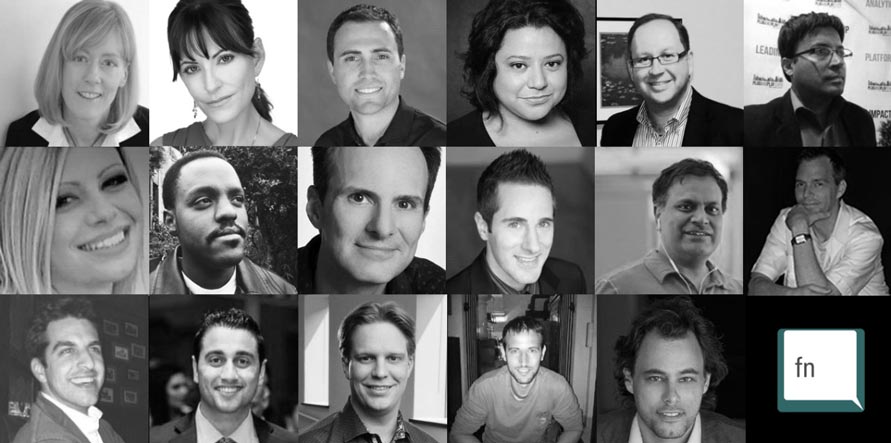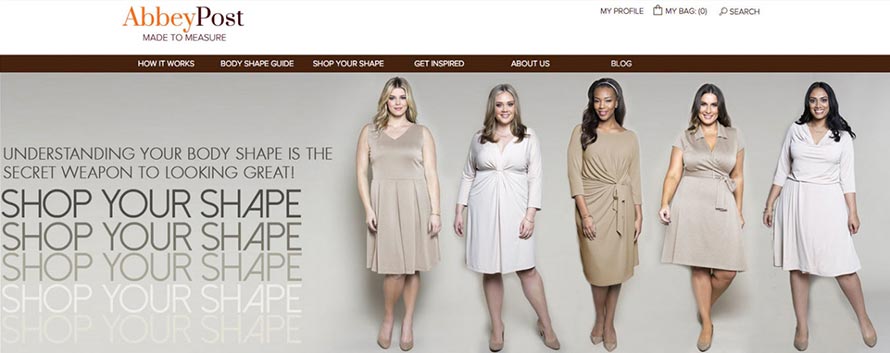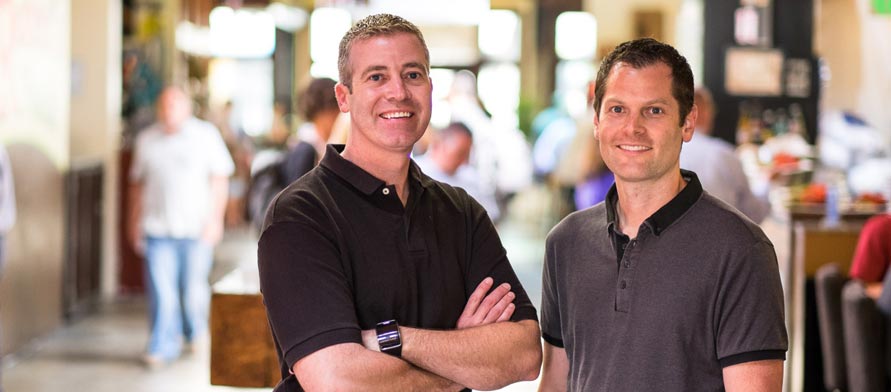
When Dan McGuire and Andrew Jones first met, each was working on his own startup. Through the South Bay peer mentorship group, they became good friends. Then shit got real. Just as Andrew’s startup, Golf Rival, was hitting a funding wall, Dan lost the CTO of his Skinnyprice, which lets online shoppers watch a video or take a survey for a variable discount on an item. Andrew started by helping out his friend —six months later, they are both running Skinnyprice full-time, and business has never been better.
Let’s start with how you guys met.
Andrew: We connected through the Founders Network peer mentorship group. It’s a smaller team that meets at least once a month where you can put anything on the table without fear of someone using it against you. We got to be pretty familiar with each other’s startups because we were meeting regularly and talking about the business problems each of us was facing.
Dan: We became pretty good friends and would talk about our startups a lot, just bounce ideas off each other. Then, basically, shit hit the fan for both of us at almost the same time, around Christmas. When I lost my CTO suddenly, Andrew just came over and started helping — we went from there.
Andrew, what was going on from your side?
Andrew: A lot of stress. Right before the holidays I learned that my lead investor and biggest partner in Golf Rival was not willing to ante up any additional dollars. Without that, I knew I was in major trouble.
When I lost my CTO suddenly, Andrew just came over and started helping.
In any case, I needed to figure out what the heck I was going to do and my initial inclination was to go back and work for a large company because I already had plenty of connections there. It was the easy way, but I was much less passionate about it. I really enjoyed every aspect of the startup space and knew I would love to go and work for another startup. But at the same time, I felt like so many things would have to line up for that to work.
So when Dan approached me, I thought, “Wow, you guys are already far enough along I won’t have to go through all the pain of the early days, but it’s early enough I can really help influence the direction of the product.”
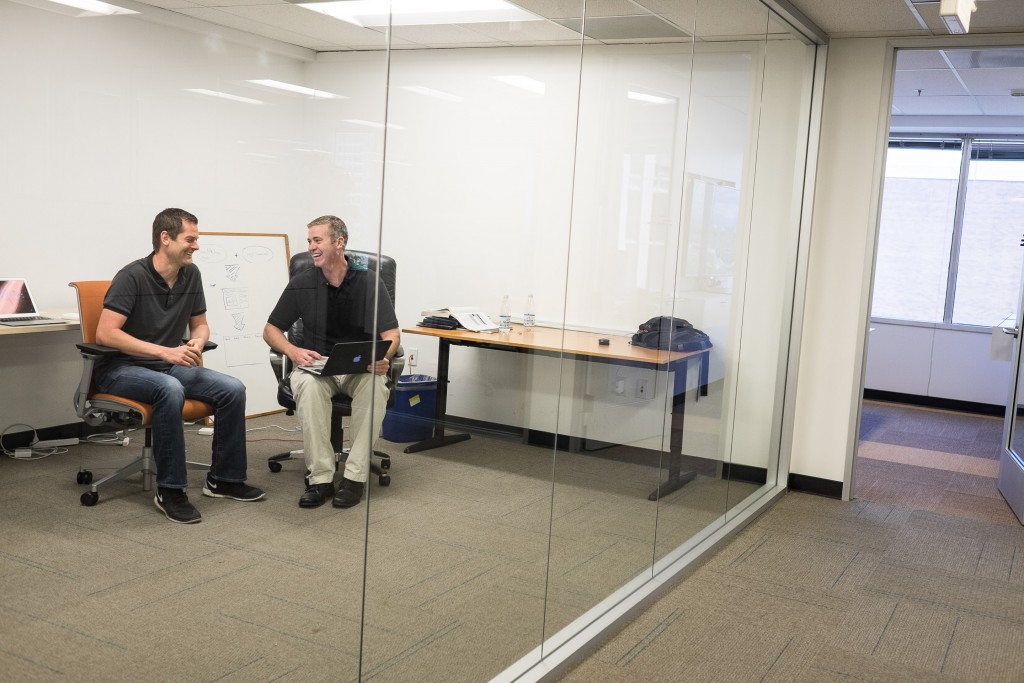
Andrew and Dan at work in their office, which they also found through connections in the peer mentorship group.
What was it like when you started working together? Did you talk about trying it out for a while first?
Dan: It wasn’t even trying it out. Andrew was like, “You’re fucked. I’ll come over and help you out.” There were no expectations. He just came over for a couple weeks and was banging out stuff.
You need someone who’s the yin to your yang.
We had actually talked before about how we should start a company together. Once we were working together, the synergy was just perfect, right from the get go. We balance each other out. I’m a supreme optimist. I think unicorns and ponies every conversation, and Andrew’s like, “That’s not what I heard!” He brings in the realist perspective. You need to have someone who’s your counterpart, who’s the yin to your yang. And I think that’s why we work so well together.
Andrew: I would very much agree with that. My strengths are not in sales, and Dan’s a sales guy. I can force myself, but it’s not as natural. I’ve already learned a lot from him on the sales end of things. Whereas, I can go way more in depth on the financials, for example.
Dan: He’s an Excel god over there.
Andrew: It takes a lot of pressure off me to be able to rely on Dan to do the things that he’s really good so I can play better in the spaces where I do well.
Andrew, was Golf Rival your first startup?
Andrew: It was my third, but it was my first where I actually left and was pursuing it full-time. When I was in college. I actually worked at a golf course and there that two brothers had bought and were managing together. I saw them and thought what they were doing was so cool. Even way back then I said to myself, “I want to own my own business.”
The reason entrepreneurship appeals to me so much is because I wake up every day knowing that if I didn’t show up for work that day or week, the company would go under. A large part of my career I spent working for large corporations. There are plenty of interesting opportunities there, but if you don’t show up for work for a day or a week or a month, it’s ultimately a blip that isn’t going to have any major impact on the company. So the work in a startup feels incredibly meaningful, like it matters a lot.
The work in a startup feels like it matters a lot.
That’s one big motivating factor; the other one is being able to bring creative thoughts and ideas to the table and go chase after it. It’s not, “Here’s the box, and this how we want you to fit it,” it’s, “Figure it the hell out!” and then you reap the benefits from anything you bring to the table.
Great. So Dan, tell me how you got into entrepreneurship.
Dan: My first encounter with entrepreneurship was when I was six years old. My sister was eight and my mom was her Girl Scout troop leader. I’m at the house with 12 girls making these really cool Halloween decorations for arts and craft, and then all they would leave them all behind when they went home. So I found this rickety old baby stroller to put these Halloween witches in, and then I went around knocking on doors and selling them for $20 a piece. I even sold 20 of them to the local convenience store. From that we got enough money to go on a big field trip — that was the first time I got the bug.
My first encounter with entrepreneurship was when I was six years old.
Then I moved on to starting a lawn mowing company, then a paper route, and I had a bunch of different companies through college. After school I started my own construction company, which got acquired by Home Depot. From there, I always had the entrepreneur bug.
I think one reason was my uncle, who took his company public when I was in high school. He flew me in to NASDAQ and I got to be there when they rang the bell. I was like, “ I know what I want to do the rest of my life, I’m going to be like Uncle John!”
I did the corporate thing at Home Depot, running a whole bunch of stores. It was exactly like what Andrew says: You don’t show up, it doesn’t matter. I have always been dreaming these big ideas and I figured sooner or later I’m going to have something that can really be a massive disruptor. With what we’re working on now, our goal is huge. We want to fundamentally re-invent pricing, we want to flip it completely on its head and change the whole market. That’s what gets me out of bed every day.
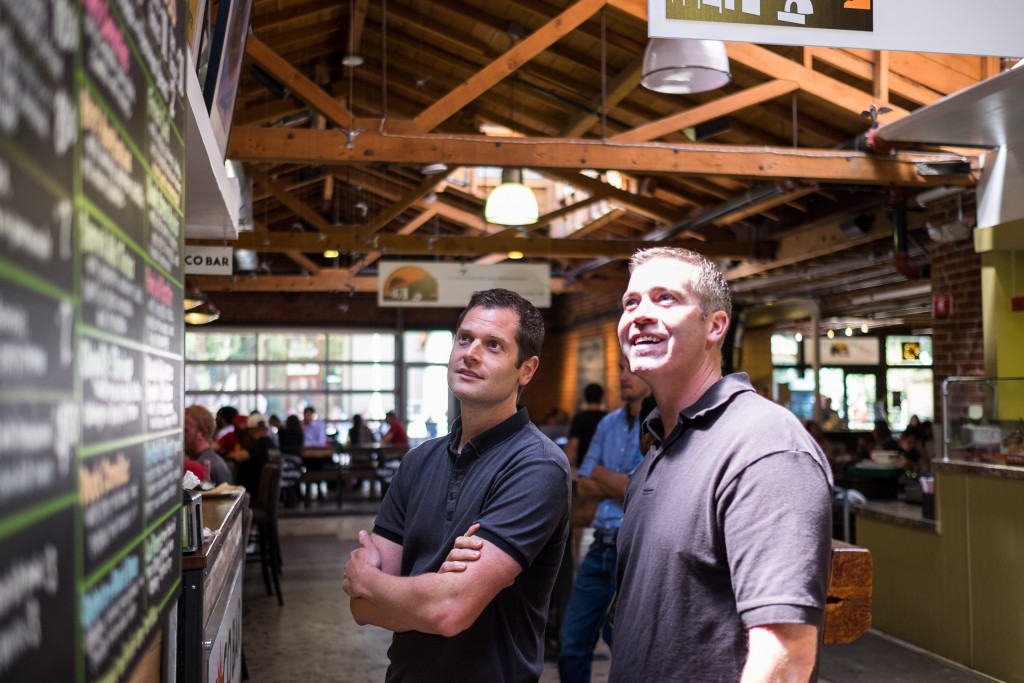
Taking a lunch break at the food hall a short walk from Skinnyprice’s downtown San Jose office.
Is there something people who aren’t founders don’t get about what you do?
Dan: Most people think entrepreneurs want to be billionaires. It’d be nice, but if you look at the numbers and you’re any kind of mathematician, you’ll realize that’s not the motivation. Entrepreneurs aren’t doing it for the money — they’re doing it because they want to put a ding in the universe.
Entrepreneurs aren’t doing it for the money — they want to put a ding in the universe.
If there’s one other thing no one told me, it’s the emotional turmoil, the roller coaster you’re getting on. It’s this constant internal battle. If you don’t get up and go to work, the company’s dead. Then there’s always this little voice in your head, “I could be making $200k. What am I doing? This is freaking crazy!” Especially when all the cards are stacked against you. That’s where it’s crucial to have a network of people that you can call and lean on. That’s the what Founders Network gives us: a support network to reach out to.
Andrew: What people wouldn’t know who aren’t founders is just how freaking unbelievably hard it is. Because even if you can have the greatest idea in the world, the vast majority of the time it’s about execution. And even then, you can be executing fantastically, but something changes in the market and totally throws things off. Often you hear these stories of the overnight success — bullshit. It’s never an overnight success. It’s really freaking hard work.
Why did you join Founders Network?
Andrew: I knew Kevin [Holmes, FN’s founder] pretty well from his Santa Clara days when he was running the center for innovation and entrepreneurship at Santa Clara. Founders Network sounded like an extension of some things that he did at Santa Clara, but just taking it to a whole new level. So I decided I’d give it a go because any social events or incremental knowledge it provided could be of significant benefit to me. Obviously, it ended up being beneficial to me in ways that I could never have predicted way back when.
Was there anything you got out of it that you didn’t expect?
Andrew: Well, finding another job! But before that, with my previous startup, I ended up getting funding because of the discussions we had in the peer mentorship group. It sparked an idea to reach out to the most powerful entrepreneur I knew and just ask him for advice. At the time I was talking to the a big golf organization that I viewed as a partner and a potential customer. This mentor said, “Hey, if they are so interested, why don’t you get them to invest?” Their whole thing was wanting things to move faster, so I went back to them and told them the best way to that was to have them invest. And they said yes.
Sometimes you’re so heads down with the company, you miss something really simple.
I attribute that to the Founders Network because, if not for them, I wouldn’t have met with the mentor who suggested I think about them as investors. It was right there in front my face, but sometimes you’re so heads down trying to move the company forward that you miss something really simple.
What about you, Dan?
Dan: I think it was about two years ago when I came out here from Boston. I got into RocketSpace, where Founders Network is based, and I think someone mentioned it.
Andrew: It’s just Dan’s personality. Dan’s “spray and pray” all over the place. If something sounds interesting, he’ll sign up. And if he gets value out of it, he keeps going — if not, he moves on to the next thing.
Dan: Yeah, I decided to try it out. The forums are great; you get to read about other people’s experiences. And then I started doing the networking events, and one of the dinners up in San Francisco, I got to sit next to Michael Selton. Here’s a guy who’s taken a billion-dollar company public, and he was like, “This is really interesting. Let’s have lunch.” So we did lunch, and it was great synergy, so I brought him on as an advisor. That was the first big score out of the Founders Network.
I ended up getting funding because of discussions in the peer mentorship group.
And another big score would be the Dell Founders 50, which we just came back from last week. We learned about that through Founders Network. It was a big summit where they flew in the all top executives from Dell and put us up in a hotel. Everyone was really helpful and we’re getting a whole bunch of press out of it, which is great.
I know founders tend to lean on their significant others a lot. Are your wives glad you joined Founders Network?
Andrew: Yeah, it is really helpful to talk with folks who get it. We started out doing the peer mentorship group, but then it was just Dan and I picking up the phone and talking to each other and just venting. Because you need someone you can vent to who truly understands. Our wives are a huge piece of that, but there’s pieces they don’t understand if they haven’t actually done a startup. Being able to connect with other founders is enormously beneficial to your sanity. That’s also why the peer mentorship group was awesome. I feel like I have a closer relationship with those guys — Scott Schreiman, Ranan Lachman, and Joël Cheuoua — than I’ve had with other folks.
You need someone you can vent to who truly understands.
Dan: Until the Founders Network, until I had friends like Andrew, my wife, Julia, was my therapist. I didn’t think I was that emotional until I started on this journey. Especially the pressure to not lose the money we put in, our friends and family put in, and investors put in. You end up leaning on your significant other. Now that we’re in Founders Network, a lot of that pressure is taken off her. Now she’s like, “You don’t seem as emotional as before; maybe Andrew’s getting more of it now.”
============================
Interview by Miki Johnson and photos by Jackson Solway, cofounders of Job Portraits, a creative agency that helps startups provide a human-centered hiring experience.

